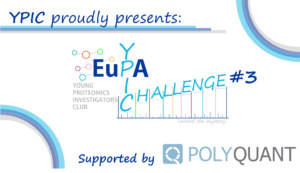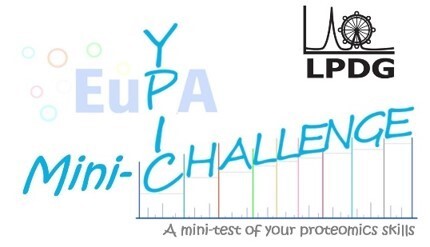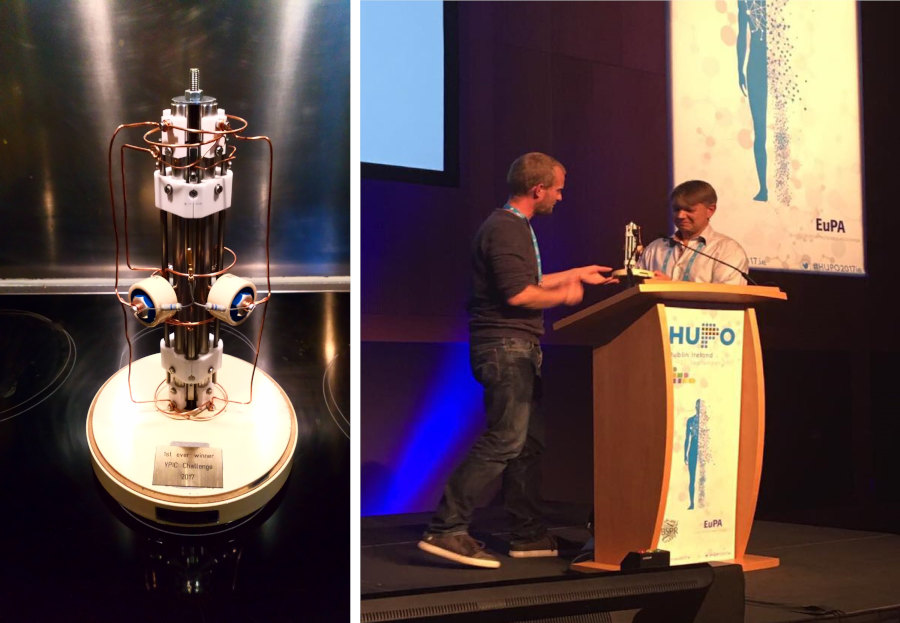
Are you excited by MS-based proteomics and always on the lookout for a chance to prove your skills? Then stay tuned – we are excited to announce the 3rd YPIC challenge, supported by PolyQuant. As with our previous challenges, we invite you to crack the secret encoded in a peptide amino acid sequence. But this time, to allow broad participation also from those without MS access, we bring the data to you. Below, you can find access to eight raw files of digested peptides, which you can use in any way you see fit to solve the challenge. Will you be the first to decipher our hidden message? Raw file link: https://www.ebi.ac.uk/pride/archive/projects/PXD030440
Overview
- Can you solve the message encoded in the protein amino acid sequence?
- 2 digests, 4 replicate measurements each
- GluC and trypsin digested
- Total protein mass ~26 kDa
- pI ~8.18, charge ~9.5
- Raw files are available at PXD030440
Questions
- What phrase is encoded in the protein?
- Which digestion performed better?
- How are non-represented letters handled?
Optional
- What kind of structure might the protein take?
- Do you find any amino acid modifications?
- Do you agree with the secret’s perspective?
Conclusion
- Manuscript-like report
- Deadline: 1st June 2022 (extended until 1 st August 2022)
- Send to ypic@eupa.org
- Criteria: creativity, originality, effort and progress on solving the
hidden mystery
We thank PolyQuant for generously designing and providing the synthetic protein used in this challenge.

The 1st and 2nd YPIC challenges proved to be a fun and educative way to challenge early career researchers into solving a proteomics challenge creatively using mass spec instrumentation. We were thrilled to repeat this, but 2020 turned out to be a very different year from what most of us had imagined. Without access to lab space for many scientists, we envisioned instead a challenge that would test early career researcher’s mass spec and proteomics knowledge in a safe and zoom-compatible fashion. And so, in collaboration with the London Proteomics Discussion Group (LPDG) and sponsored by Matrix Science, we launched the 2020 YPIC LPDG Mini-challenge.
The YPIC LPDG Mini-challenge consisted of four independent proteomics riddles, in each of which participants had to solve a mass spectrometry spectrum. Each spectrum encoded a hidden message, some including PTMs, focusing on covid peptides or containing a mixed ion series. The first and one random person to get it right each won £10, awarded at the end of the monthly LPDG webinar series.
Finally, participants were invited to solve a grand prize challenge that could win them £100. To achieve this, the peptide sequences from the preceding four mini-challenges had to be arranged in a crossword puzzle. The final solution was to guess a sentence that we had all heard way too much in 2020.
For us at YPIC and LPDG, the mini-challenge was an excellent opportunity to combine forces and get early career researchers engaged in using their skill sets in a non-traditional way – if only to escape the pandemic for a while. And it seems like we were able to achieve our goal, with feedback including:
- “The challenge was a lot of fun and I hope there are more to come!”
- “Thanks so much for putting together this challenge – this is the first time I’ve attempted de novo peptide sequencing and I’ve learned so much.”
- “I understand that I came in 2nd in the challenge and one of my students […] beat me out…so perhaps I am having some effect.”
- “Excellent message by the way! That is the most fun part of it. I was laughing. Looking forward to more challenges.”
If you want to test how you would have performed in the mini-challenges, you can access them (and the solutions) here.
As experts in proteomics, we are well accustomed to deciphering the proteome of living cells, routinely identifying thousands of proteins. So how difficult can it be to decipher the sequence of a single one expressed in E.coli? In collaboration with PolyQuant, we posed this challenge in 2018 to early career researchers around the globe. In the year before, seven teams had managed to successfully decipher English sentences taken from a book and encoded in a peptide mixture. The many ways that teams all over the world had come up with to solve this challenge proved the creativity of young proteomics scientists. But how would they perform, when the task is to characterize a protein sequence forming an unknown English sentence, not to be found in any book?
Two teams successfully faced and solved this challenge. Team Ignoble, formed by members Lindsey K. Pino, Andy Lin and Wout Bittremieux (University of Washington, USA), successfully applied circular dichroism and top-down analysis to analyze the protein structure, as well as PTM analysis and spectral networking to decipher its message. Lili Niu (University of Copenhagen, Denmark) convinced by using multiple fragmentation techniques, created a solid bioinformatics pipeline to decipher the protein sequence with a dictionary approach, and discussed the philosophical side of what E. coli might want to communicate. After an impressive finale at the European Proteomics Association (EUPA) Congress 2019, where both teams presented their findings, Lili Niu became the official YPIC Challenge 2 winner.
The second YPIC Challenge highlighted the creativity, teamwork, and engagement that proteomics early career researchers (ECR) use to solve difficult tasks in- and outside of the lab. It showed what great things can happen when young scientists get together, and it is precisely this strength that YPIC will continue to support and foster.

The challenge #1 was concluded at the HUPO conference in Dublin, Ireland, 2017.
Read a few of last year’s manuscripts right here:
- Sweet Google O’ Mine – The Importance of Online Search Engines for MS-facilitated, Database-independent Identification of Peptide-encoded Book Prefaces Alexander Hogrebe, Rosa R. Jersie-Christensen (2017 Winners) (Jesper V. Olsen’s group at the Novo Nordisk Foundation Center for Protein Research, University of Copenhagen, Denmark)
- Math, Science, History, Unraveling the mystery. That all started with the big bang de novo! Ekaterina Ilgisonis, Olga Kiseleva, Ksenia Kuznetsova, (Institute of Biomedical Chemistry, Moscow, Russia)
- The Author Identified by his method: EuPA YPIC challenge solved. Maria Indeykina, Dmitriy Podgrudkov, Alexey Kononikhin, (Emanuel Institute of biochemical Physics RAS, Moscow, Russia)
- YPIC manuscript_CouncilOfRicks Pino, Lindsay K; Searle, Brian C; Yang, Han-Yin (Department of Genome Sciences, University of Washington, Seattle, US)
- Peptidal_Investigators Blank-Landeshammer, Bernhard, (Leibniz-Institut für Analytische Wissenschaften – ISAS, Germany)
All participating teams of challenge #1:
| ProtINIBIC | Gonzalez-Rodriguez Lucia, Calamia Valentina, Fernandez-Puente Patricia |
| MC RootPies | Edhager Anders, Thyssen Stine, Oxvig Anne-Mette |
| Zubarevlab | Chernobrovkin, Alexey |
| Moscow-FTICR | Kononikhin Alexey, Indeykina Maria, Bugrova Anna |
| CSIC-Vigo | Carrera Mónica, Cañas Benito, Mateos Jesús |
| Inspectomics | Licha David, Scheidt Tamara, Strasser Lisa |
| Peptidal Investigators | Blank-Landeshammer, Bernhard |
| lab006 | Bubis, Julia; Ivanov, Mark; Levitsky; Lev |
| BochuMS | Uszkoreit, Julian; Eggers, Britta; Pacharra, Sandra |
| TBT | Trung Tran, Benoit J.Kunath, Tine Rise Tuveng |
| AraPLA | Tilak Priyadarshini, Brünje Annika, Lassowskat Ines |
| Ms. MS | Lobas Anna, Solovyeva Elizaveta |
| MEBL | Sukumaran Vrinda, Chekidhenkuzhiyil Jasmin, John Franklin |
| Axl Rose | Jersie-Christensen, Rosa; Hogrebe, Alexander |
| Omom | Ilgisonis Ekaterina, Kuznetsova Ksenia, Kiseleva Olga |
| STeamRevolution | Sander Willems, Senne Cornelis, Simon Daled |
| PROTEAMO | Greco Viviana, Corasolla Carregari Victor, Marini Federica |
| Council of Ricks | Pino, Lindsay K.; Yang, Han-Yin; Searle, Brian C. |
| SCIMOETORP | Ms. Komal Kumari Mandal, Ms. Lylia Drici, Ms. Sheila Lefoli Maibom-Thomsen |

